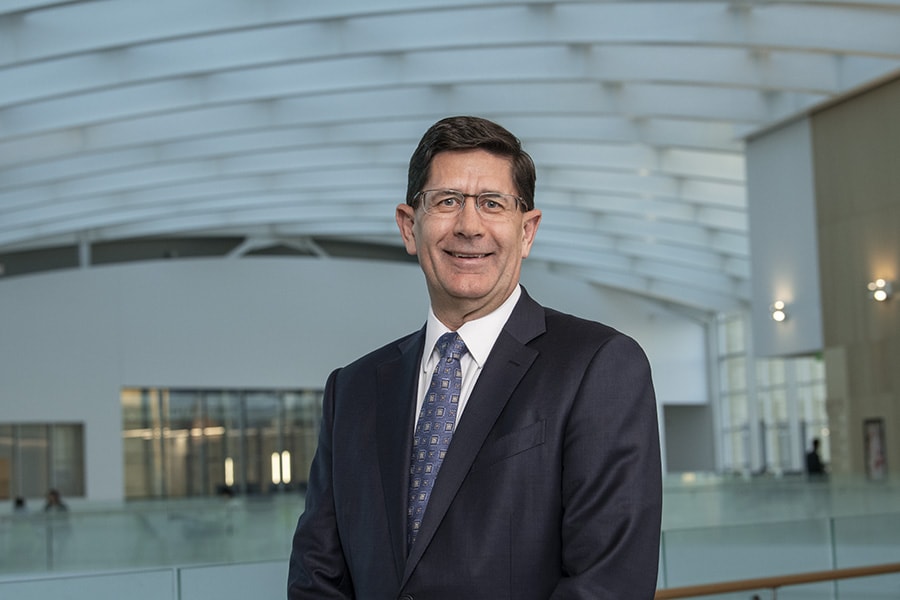
Personal Mention
Robert M. Dammon, dean of Carnegie Mellon's nationally ranked Tepper School of Business, has announced he will step down from the position. Dammon will serve as dean until a successor is in place, when he will return to the Tepper School faculty full time. In his ninth year as dean, Dammon's leadership is highlighted by last year's opening of the David A. Tepper Quadrangle, a 315,000 square-foot building that houses the Tepper School and is a hub for collaboration, innovation, creativity and entrepreneurship on the Carnegie Mellon campus. Dammon was tasked with planning, opening and fundraising for the $201 million project, which highlights the Tepper School's leadership at the intersection of business, technology and analytics. "As dean, Dr. Dammon has been instrumental in establishing the Tepper School as one of the nation's premier business schools for undergraduate, graduate and online students," said Jim Garrett, Carnegie Mellon provost and chief academic officer. "He has helped to transform the school in exceptional ways by strengthening and expanding the academic programs, interdisciplinary research opportunities and learning environments for both the Tepper School and the entire university community." Find out more.
 Yulia Tsvetkov, an assistant professor in the School of Computer Science's Language Technologies Institute, and her research team have found that media coverage of the #MeToo movement shows accusers are often portrayed as sympathetic, but with less power and agency than their alleged perpetrators. "The goal of the movement is to empower women, but according to our computational analysis that's not what's happening in news stories," Tsvetkov said. Tsvetkov's research team used natural language processing (NLP) techniques to analyze online media coverage of #MeToo narratives that included 27,602 articles in 1,576 outlets. In a paper published earlier this year, they also looked at how different media outlets portrayed perpetrators, and considered the role of third-party actors in news stories. Their work draws insights from social psychology research, and looks at the dynamics of power, agency and sentiment, which is a measurement of sympathy. The researchers analyzed verbs to understand their meaning, and put them into context to discern their connotation. Find out more.
Yulia Tsvetkov, an assistant professor in the School of Computer Science's Language Technologies Institute, and her research team have found that media coverage of the #MeToo movement shows accusers are often portrayed as sympathetic, but with less power and agency than their alleged perpetrators. "The goal of the movement is to empower women, but according to our computational analysis that's not what's happening in news stories," Tsvetkov said. Tsvetkov's research team used natural language processing (NLP) techniques to analyze online media coverage of #MeToo narratives that included 27,602 articles in 1,576 outlets. In a paper published earlier this year, they also looked at how different media outlets portrayed perpetrators, and considered the role of third-party actors in news stories. Their work draws insights from social psychology research, and looks at the dynamics of power, agency and sentiment, which is a measurement of sympathy. The researchers analyzed verbs to understand their meaning, and put them into context to discern their connotation. Find out more.
School of Computer Science (SCS) Dean Martial Hebert has named James Herbsleb to serve as interim director of the Institute for Software Research (ISR) and Srinivasa Narasimhan to serve as interim director of the Robotics Institute. Herbsleb, an ISR professor, will begin his new role at the end of August, when current director Bill Scherlis goes on leave. Narasimhan will take the place of Hebert, who became SCS dean as of Aug. 15. Both will serve until permanent leaders are identified for their departments.
 Herbsleb is best known for his research in collaboration and coordination on large-scale software engineering projects, and developing and testing a theory of coordination that brings together the technical and human aspects of software development. He has addressed such topics as how development teams can function and collaborate even when they are geographically dispersed. He also has explored issues related to open source development, both in individual projects and in large-scale ecosystems of interdependent projects. He is the recipient of multiple awards, most recently the Outstanding Research Award presented by the Association for Computing Machinery’s Special Interest Group on Software Engineering (SIGSOFT).
Herbsleb is best known for his research in collaboration and coordination on large-scale software engineering projects, and developing and testing a theory of coordination that brings together the technical and human aspects of software development. He has addressed such topics as how development teams can function and collaborate even when they are geographically dispersed. He also has explored issues related to open source development, both in individual projects and in large-scale ecosystems of interdependent projects. He is the recipient of multiple awards, most recently the Outstanding Research Award presented by the Association for Computing Machinery’s Special Interest Group on Software Engineering (SIGSOFT). Narasimhan, a professor in the Robotics Institute, has established a notable sensing group within the institute. His group focuses on novel techniques for imaging, illumination and light transport to enable applications in vision, graphics, robotics, intelligent transportation, smart cities, agriculture and medical imaging. He has led development of such innovations as programmable headlights and is leading research into non-line-of-sight imaging. He is associate director of a National Science Foundation Expeditions in Computing that is developing cameras to see deep beneath the skin. Narasimhan was the inaugural director of the Robotic Institute's first-of-its-kind master’s degree in computer vision. He has won a wide variety of awards and best paper citations.
Narasimhan, a professor in the Robotics Institute, has established a notable sensing group within the institute. His group focuses on novel techniques for imaging, illumination and light transport to enable applications in vision, graphics, robotics, intelligent transportation, smart cities, agriculture and medical imaging. He has led development of such innovations as programmable headlights and is leading research into non-line-of-sight imaging. He is associate director of a National Science Foundation Expeditions in Computing that is developing cameras to see deep beneath the skin. Narasimhan was the inaugural director of the Robotic Institute's first-of-its-kind master’s degree in computer vision. He has won a wide variety of awards and best paper citations.
